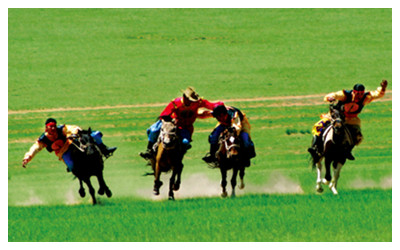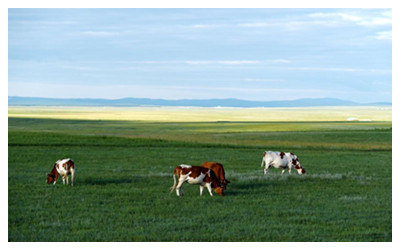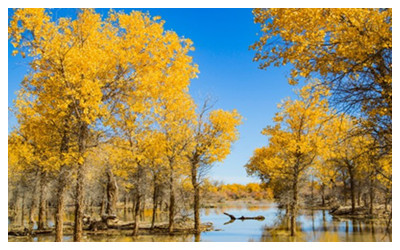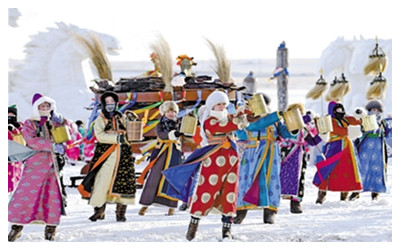Skype: neodalle-travel
Tel: +86 135 7447 2266
E-mail: sales@visitaroundchina.com
Features of Inner Mongolia Climate
Located inland on Inner Mongolian Plateau with middle to high latitude, Inner Mongolia weather is characterized by longer cold winter, less rainfall, large temperature difference between day and night, strong wind, long hours of sunshine and shorter frost-free period. The annual average number of windy days is 10 – 40 and some places like Ulanqab and Xilingol have over 50. In most regions, the annual average number of sandstorm days is about 5 – 20. The average annual temperature is about -5 – 10ºC
The four seasons are quite different in Inner Mongolia. The temperature in spring rises sharply, and there are a lot of windy days and less rainfall. Summer is short. And most rainfall are in this season. In autumn, the temperature drops suddenly and the frost always come early. Winter is rather long with cold snap.
Best time to visit Inner Mongolia
In general, the best time to tour Inner Mongolia is from July to September. But considering the wide range of the region, the best travel time is different for each part. For the west part, July to mid-October are all suitable. For the east grassland, July to August is the best when the grass is green and the sky is blue. The grand Nadam Fair is also held during this period. As for Daxing’anling forest region, middle to late May with blossom wild flowers and middle of September with colorful leaves are recommended.
Inner Mongolia Climate by Seasons
Considering the changeable Inner Mongolia weather, tourists need to pay more attention to the weather forecast, especially the temperature difference between day and night. Even if you travel in summer, long-sleeved shirts or jackets are also needed at night.
The tourism resource in Inner Mongolia is mainly composed of grasslands, historical sites, deserts, lakes, forests and nomadic customs. Most forest landscapes are distributed in Daxing’anling while historical relics gather in Hohhot and Baotou. Tourists can watch Mongolia song and dance performance, horse racing, wrestling, arrow shooting, etc on the vast grassland like Hulunbuir Prairie and Xilingol Grassland. There are also famous attractions like Hulun Lake. All these displays strong nomadic features. Also, camel-riding, sand sliding and motorcycle are worth experiencing on desert like Singing Sand Ravine.
 In Spring (Apr - Jun)
In Spring (Apr - Jun)
In spring, Inner Mongolia weather is mild and windy in general without too much rain. You can go to Hohhot to know the history of the Mongolia nationality. Zhaojun Museum in Hohhot is built to memorize one of the four beautiful ladies in ancient China Wang Zhaojun. The museum displays the story of Zhaojun’s wedding with the nomadic tribe leader and Hun Culture. Dazhao Temple, the oldest and largest building is also worth visiting. Also, you can go northward to Gegentala Grassland to appreciate the colorful wild flowers, endless green land dotted with white yurts and experience nomadic customs.
What to Wear: trench coat, thick jacket, windbreaker, sneaker, scarf, hat, mask…
 Summer (Jul - Aug)
Summer (Jul - Aug)
Summer is the best time to travel. Tourists can go to Hulunbuir Prairie. Lie down on the soft grassland and enjoy the sunshine or see herds of sheep under the blue sky. And during this period, Nadam Fair, the grandest festival of Mongol, is held to celebrate the harvest with activities like horse racing, wrestle, archery and characteristic singing and dance performance. In Hulun Lake, tourists can see the blue sky reflected on the wide water surface clearly and a variety of birds flying over it. Watching sunrise in early morning, enjoying the bright moon at night or taking a boat on Hulun Lake are really unforgettable. Known as the No. 1 Wetland in Asia, Ergun Wetlands is favored by photographers because of its boundless shrub and meadows and rather abundant wild plants and animals. If you wanna see the whole wetland, climb to the top of the main peak. To feel the unique Russian ethic culture, tourists can go to Enhe Russian Ethic Township where you can taste authentic Russian cuisines and live in the Mukeden House in Russian style.
What to Wear: T-shirt, shots, dress, shirt, thin overcoat, light pants, umbrella, sunscre.
 In Autumn (Sep - Oct)
In Autumn (Sep - Oct)
Every year from early to middle October, the Populus Euphratica Forest in Ejina attracts plenty of tourists. Thousands of acres of poplar trees grow along Heihe River which is like a golden sea. Try to avoid National Day Holiday from Oct.1 – 7th, when it is too crowded. Sumu Mountain Forest Park in Ulanqab is covered with various trees and shrubs. In autumn, the plants turn yellow or red and the flowers are dotted among the trees. Walking in the path, tourists may encounter lovely wild animals. Singing Sand Ravine not far from Baotou is famous for the different sounds made by the sands when people slide down from the top of the dunes. Experiencing it is really surprising and memorable. In the scenic area, travelers can also see the lake and oasis.
What to Wear: long-sleeved shirts, sportswear, thick overcoat, sweat pants, padded jacket…
 In Winter (Nov - Mar)
In Winter (Nov - Mar)
Arxan – Chaihe Scenic Area is quite suitable for travel in winter. Covered with snow from November to April next year, the scenic area boasts a wonderful snow scenery. And the snow is quite thick and good enough for various kinds of ski. The world’s largest hot spring groups is located here so bathing in the hot spring is definitely a nice try. And tourist can see the volcanic lake groups. In Xilingol Grassland, there is Ice and Snow Nadam Fair lasting for four months. At that time, competitions of horse riding, wrestle, and archery are held and performances of martial arts, polo, archery and motorcycle are put on.
What to Wear: downcoat, padded overcoat, padded trousers, wool sweater, snow boats…
 Ask Questions ?
Ask Questions ?